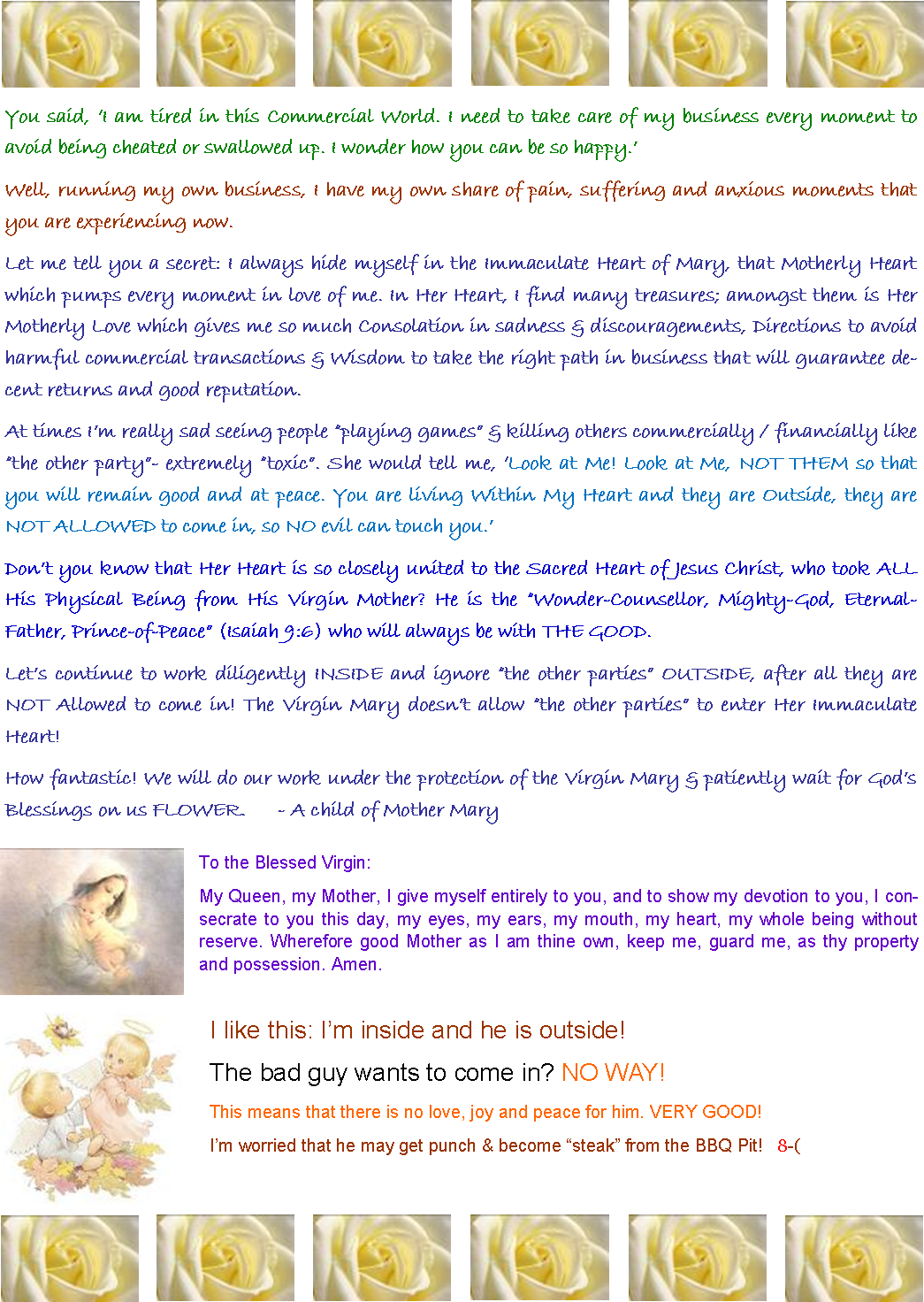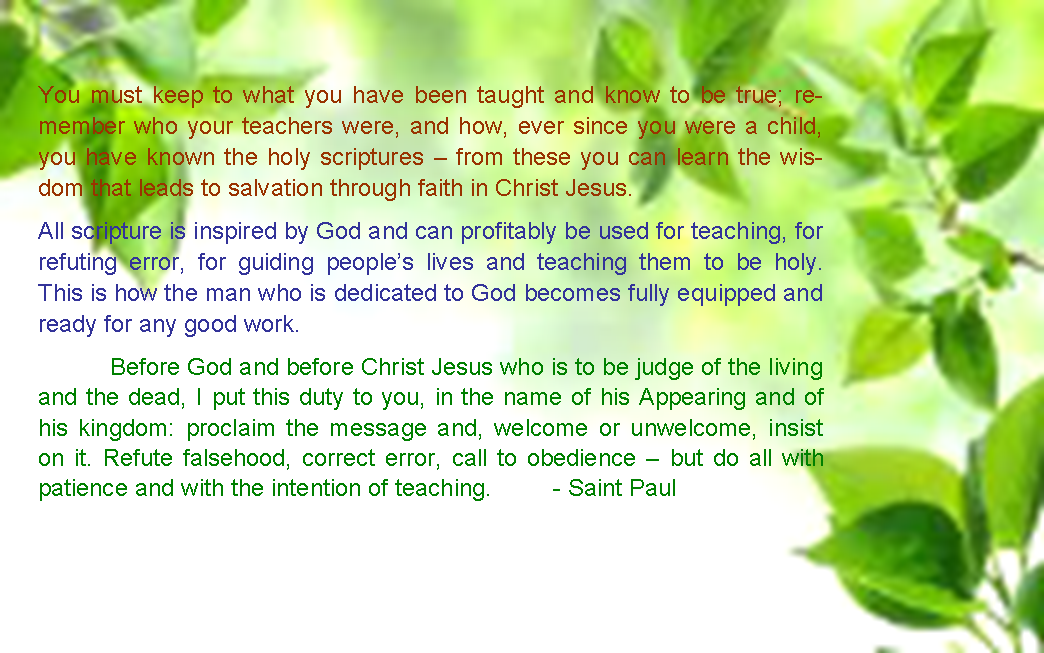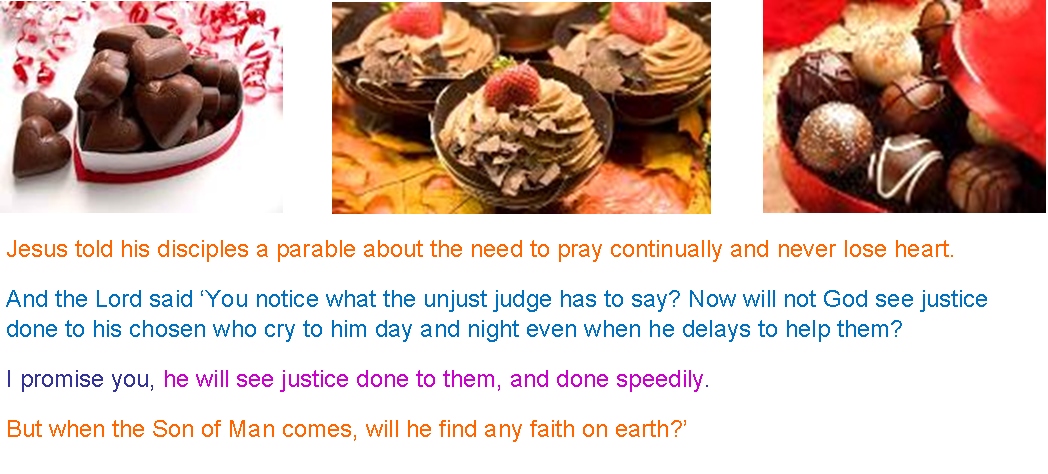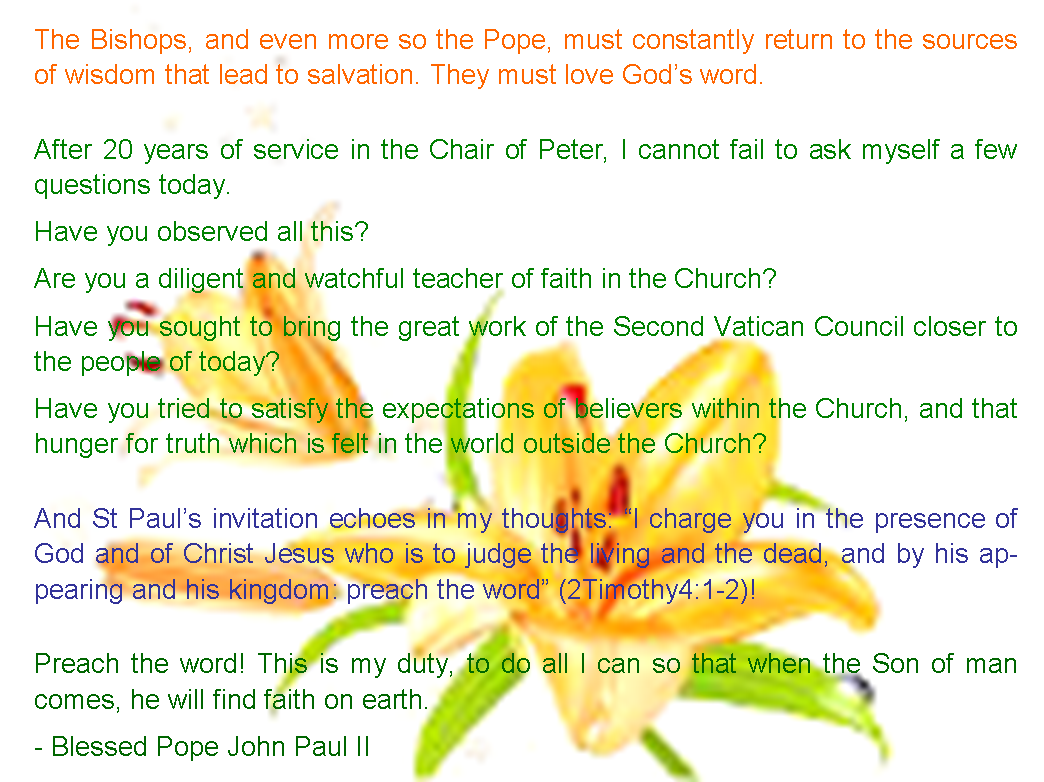|
72 |


|
Extracted from the book of Exodus 17: 8-13 The Amalekites came and attacked Israel at Rephidim. Moses said to Joshua, ‘Pick out men for yourself, and tomorrow morning march out to engage Amalek. I, meanwhile, will stand on the hilltop, the staff of God in my hand.’ Joshua did as Moses told him and marched out to engage Amalek, while Moses and Aaron and Hur went up to the top of the hill. As long as Moses kept his arms raised, Israel had the advantage; when he let his arms fall, the advantage went to Amalek. But Moses’ arms grew heavy, so they took a stone and put it under him and on this he sat, Aaron and Hur supporting his arms, one on one side, one on the other; and his arms remained firm till sunset. With the edge of the sword Joshua cut down Amalek and his people. |

|
Extracted from the 2nd letter of Saint Paul to Timothy: 2 Timothy 3:14-4:2 You must keep to what you have been taught and know to be true; remember who your teachers were, and how, ever since you were a child, you have known the holy scriptures – from these you can learn the wisdom that leads to salvation through faith in Christ Jesus. All scripture is inspired by God and can profitably be used for teaching, for refuting error, for guiding people’s lives and teaching them to be holy. This is how the man who is dedicated to God becomes fully equipped and ready for any good work. Before God and before Christ Jesus who is to be judge of the living and the dead, I put this duty to you, in the name of his Appearing and of his kingdom: proclaim the message and, welcome or unwelcome, insist on it. Refute falsehood, correct error, call to obedience – but do all with patience and with the intention of teaching. |

|
Extracted from the holy Gospel according to Luke 18:1-8: Jesus told his disciples a parable about the need to pray continually and never lose heart. ‘There was a judge in a certain town’ he said ‘who had neither fear of God nor respect for man. In the same town there was a widow who kept on coming to him and saying, “I want justice from you against my enemy!” For a long time he refused, but at last he said to himself, “Maybe I have neither fear of God nor respect for man, but since she keeps pestering me I must give this widow her just rights, or she will persist in coming and worry me to death.”’ And the Lord said ‘You notice what the unjust judge has to say? Now will not God see justice done to his chosen who cry to him day and night even when he delays to help them? I promise you, he will see justice done to them, and done speedily. But when the Son of Man comes, will he find any faith on earth?’
Sharing:
It was the 29th Sunday in Ordinary Time on 20 October 2013.
Here are the Readings that were read in the Eucharistic Celebrations all over the world on the same day (see above): 1st Reading: Exodus 17: 8-13, Responsorial: Psalm 121:1-8 – see Encouragements-90, 2nd Reading: 2 Timothy 3:14-4:2 & Gospel Reading: Luke 18:1-8.
We have extracted the Homilies of Blessed Pope John Paul II, Pope Benedict XVI & Pope Francis I based on the aforesaid Readings to share with you, so that you could similarly be encouraged:
20th ANNIVERSARY OF PONTIFICATE HOMILY OF JOHN PAUL II Sunday, 18 October 1998
1. “When the Son of man comes, will he find faith on earth?” (Luke 18:8).
Throughout the 2,000 years of the Christian era, this question which Christ once asked his disciples has often challenged the men whom divine Providence has called to take up the Petrine ministry. I am thinking at the moment of all my Predecessors, recent and remote. I am thinking especially of myself and of what happened on 16 October 1978. At today’s celebration, I give thanks to the Lord with you for these 20 years of Pontificate.
I remember that 26 August 1978, when the words addressed to my immediate Predecessor by the first Cardinal in the order of precedence and Camerlengo of the Holy Roman Church rang out in the Sistine Chapel: “Do you accept your canonical election as Supreme Pontiff?”. “I accept”, Cardinal Albino Luciani replied. “By what name do you wish to be called?”, Cardinal Villot continued. “John Paul” was the answer.
At the time who would have thought that a few weeks later this same question would be addressed to me as his successor? To the first question: “Do you accept”, I replied: “In the obedience of faith before Christ my Lord, abandoning myself to the Mother of Christ and the Church, and conscious of the great difficulties, I accept”. And to the next question: “By what name do you wish to be called”, I too said: “John Paul”.
After the Resurrection, Christ asked Peter three times: “Do you love me?” (cf. John 21:15-17). The Apostle, aware of his own weakness, answered: “Lord, you know everything; you know that I love you”, and received from him the mandate: “Feed my sheep” (John 21:17). The Lord entrusted this mission to Peter and, through him, to all his successors. He addressed these same words to the one who is speaking to you today, when he was entrusted with the task of strengthening the faith of his brethren.
How many times my thoughts have returned to Jesus’ words, which Luke has recorded for us in his Gospel. Shortly before facing his Passion, Jesus said to Peter: “Simon, Simon, behold, Satan demanded to have you, that he might sift you like wheat, but I have prayed for you that your faith may not fail; and you, when you have turned again, strengthen your brethren” (Luke 22:31-33). “Strengthening his brethren in the faith” is thus one of the essential aspects of the pastoral service entrusted to Peter and his successors. In today’s liturgy Jesus asks the question: “When the Son of man comes, will he find faith on earth?”. This is a question that challenges everyone, but in particular the successors of Peter.
“When he comes, will he find...?”. His coming draws closer with the passing of each year. In celebrating the Holy Sacrifice of the Mass, we always say after the consecration: “We proclaim your death, O Lord, we proclaim your resurrection; we await your return in glory”. When he comes, will he find faith on earth? |

|
2. This Sunday’s liturgical readings can suggest a twofold answer to his question. We find the first in St Paul’s exhortation to his trusted co-worker, Timothy. The Apostle writes: “I charge you in the presence of God and of Christ Jesus who is to judge the living and the dead, and by his appearing and his kingdom: preach the word, be urgent in season and out of season, convince, rebuke and exhort, be unfailing in patience and in teaching” (2 Timothy 4:1-2).
This text presents in summary form a precise plan of action. Indeed, the apostolic ministry, especially the ministry of Peter, consists first and foremost in teaching. Anyone who teaches divine truth must himself “remain faithful”, as the Apostle also writes to Timothy, “to what he has learned and believed” (2 Timothy 3:14).
The Bishops, and even more so the Pope, must constantly return to the sources of wisdom that lead to salvation. They must love God’s word. After 20 years of service in the Chair of Peter, I cannot fail to ask myself a few questions today. Have you observed all this? Are you a diligent and watchful teacher of faith in the Church? Have you sought to bring the great work of the Second Vatican Council closer to the people of today? Have you tried to satisfy the expectations of believers within the Church, and that hunger for truth which is felt in the world outside the Church?
And St Paul’s invitation echoes in my thoughts: “I charge you in the presence of God and of Christ Jesus who is to judge the living and the dead, and by his appearing and his kingdom: preach the word” (2 Timothy 4:1-2)! Preach the word! This is my duty, to do all I can so that when the Son of man comes, he will find faith on earth.
Continue next page …
27 October 2013 |